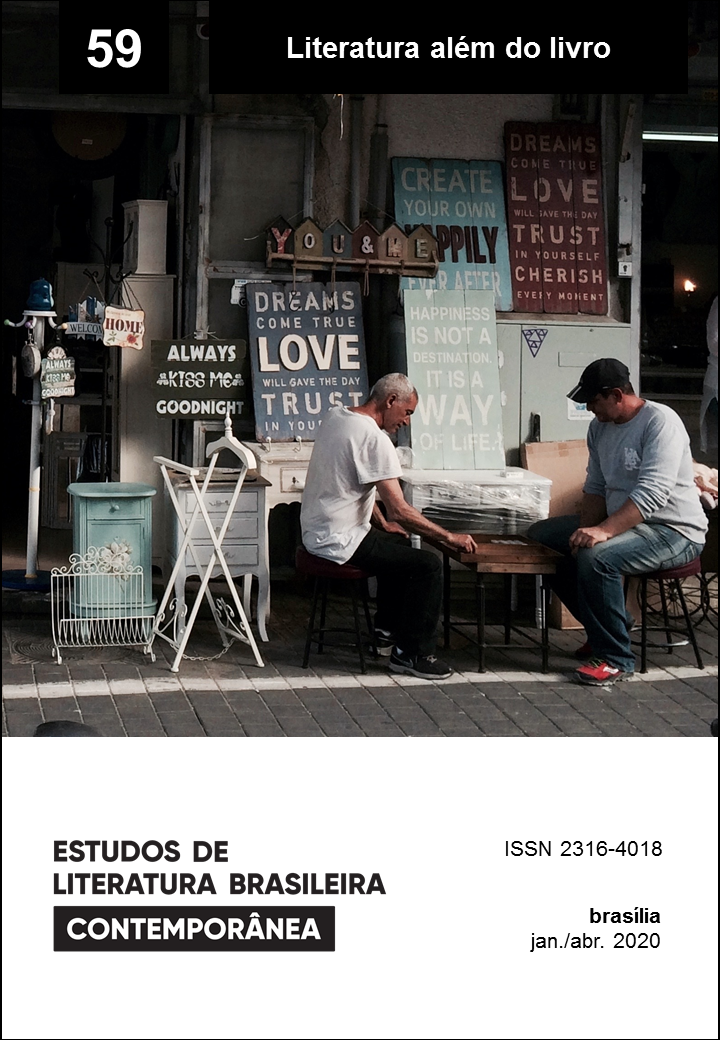Aesthetics of aspiration, policies of inclusion: comments to development in two saraus of Rio de Janeiro
DOI:
https://doi.org/10.1590/2316-40185917Keywords:
saraus, periphery, development, middle classAbstract
During the last five years and after the days of June, the tradition of the Saraus in Brazil experienced a quantitative change: its incidence increased exponentially throughout the territory of the country, following the example of pioneering events such as Cooperifa. The jump was also qualitative: there is a version of these cultural performances that responds to the new socioeconomic dynamics of the country and that discovers a repertoire of meanings that can be seen as part of a genealogy of development that has always been present behind its staging. The article presents, from the ethnographic work in three of these events, a cultural landscape that interprets the context and meanings of a phenomenon that is not only inscribed in relation to the tradition of the saraus as the space par excellence of peripheral culture, but with the narratives of economic development in the region, especially those put into practice by the governments of the Workers' Party. Commentary and rupture, this new scene of saraus sheds clues about the obstacles still present to the desire for equality of the Brazilian nation.
Downloads
References
BENMERGUI, Leandro (2009). The alliance for progress and housing policy in Rio de Janeiro and Buenos Aires in the 1960s. Urban History, v. 36, n. 2, p. 303”“326.
CALDEIRA, Teresa Pires do Rio (2000). City of walls: crime, segregation, and citizenship in São Paulo. Berkeley: University of California Press.
CHAMONE, Aline Maria Macedo (2016). Um estudo sobre os saraus da periferia de São Paulo: espaços para “aprender na amizade e na liberdade”. Dissertation (Maestría en Educación) ”“ Universidad de São Paulo, São Paulo.
DAGNINO, Evelina (2005). “We all have rights, but…” Contesting concepts of citizenship in Brazil. In: KABEER, Naila. Inclusive citizenship: meanings and expressions. London: Zed. p. 149-163.
DALCASTAGNÈ, Regina (2014). Deslocamentos urbanos na literatura brasileira contemporânea. Journal for Brazilian Studies, v. 3, n. 1, p. 31”“47.
HOLSTON, James (2008). Insurgent citizenship: disjunctions of democracy and modernity in Brazil. Princeton: Princeton University Press.
LEHNEN, Leila (2016). Literatura e direitos humanos na obra de Sacolinha. Estudos de Literatura Brasileira Contemporânea, Brasília, n. 49, p. 79-104, dic.
LEHNEN, Leila (2018). O direito à poesia. In: DALCASTAGNÈ, Regina; DUTRA, Paula; FREDERICO, Graziele (Org.). Literatura e direitos humanos. Porto Alegre: Zouk.
LEHNEN, Leila Maria (2013). Citizenship and crisis in contemporary Brazilian literature. New York: Palgrave MacMillan.
MCCANN, Bryan (2003). Carlos Lacerda: the rise and fall of a middle-class populist in 1950s Brazil. Hispanic American Historical Review, n. 4, p. 661.
NASCIMENTO, Erica Peçanha do (2009). Vozes marginais na literatura. Rio de Janeiro: Aeroplano.
OLIVEIRA, Rejane Pivetta de; PELLIZZARO, Tiago (2017). Literature and the sarau: political implications. Abriu: Textuality Studies on Brazil, Galicia and Portugal, n. 6, p. 65”“83.
PANTOJA, Fabio Zambrano (2002). De la Atenas suramericana a la Bogota moderna. Revista de Estudios Sociales, n. 11, p. 26.
PEREIRA, Anthony W.; MATTEI, Lauro (2015). The Brazilian economy today: towards a new socio-economic model? New York: Palgrave Macmillan.
RAMA, Angel (1984). La ciudad letrada. Hanover: Ediciones del Norte.
ROBBINS, Bruce (2007). Upward mobility and the common good: toward a literary history of the Welfare State. Princeton: Princeton University Press.
SOUZA, Jessé; ARENARI, Brand (2010). Os batalhadores brasileiros: nova classe média ou nova classe trabalhadora?. Belo Horizonte: Editora da UFMG.
TENNINA, Lucía (2014). Brasil periférico: literatura marginal de São Paulo. Ciudad de México: Secretaría de Cultura.
TENNINA, Lucía (2017). The deterritorialization and internationalization of the saraus in the periphery of São Paulo. Abriu: Textuality Studies on Brazil, Galicia and Portugal, Barcelona, n. 6, p. 85-103.
VAZ, Sérgio (2008). Cooperifa: antropofagia periférica. Rio de Janeiro: Aeroplano.
WALLERSTEIN, Immanuel (1988). The Bourgeois(ie) as concept and reality. New Left Review, n. 167, p. 91.
YOUNG, Iris Marion (1990). Justice and the politics of difference. Princeton: Princeton University Press.
Downloads
Published
How to Cite
Issue
Section
License
Authors who publish in this journal agree to the following terms:
a) The authors maintain the copyright and grant the journal the right of first publication, the work being simultaneously licensed under the Creative Commons Attribution License-Non Commercial 4.0 which allows the sharing of the work with acknowledgment of the authorship of the work and publication this journal.
b) Authors are authorized to enter into additional contracts separately, for non-exclusive distribution of the version of the work published in this journal (eg publish in institutional repository or as a book chapter), with authorship recognition and publication in this journal.
c) Authors are allowed and encouraged to publish and distribute their work online (eg in institutional repositories or on their personal page) after the editorial process, as this can generate productive changes, as well as increase the impact and citation of published work (See The Effect of Free Access).
d) The authors of the approved works authorize the magazine to, after publication, transfer its content for reproduction in content crawlers, virtual libraries and the like.
e) The authors assume that the texts submitted to the publication are of their original creation, being fully responsible for their content in the event of possible opposition by third parties.


